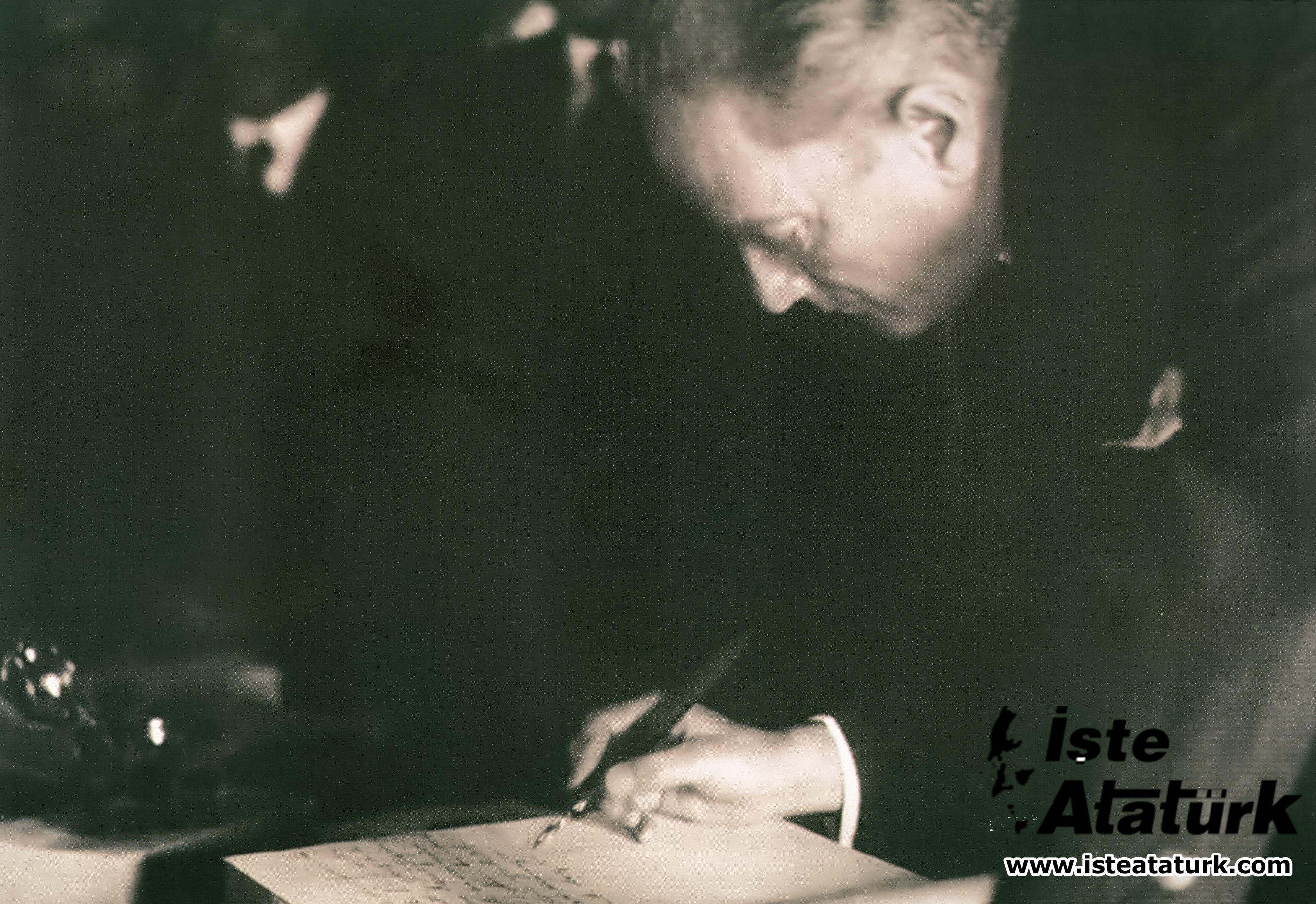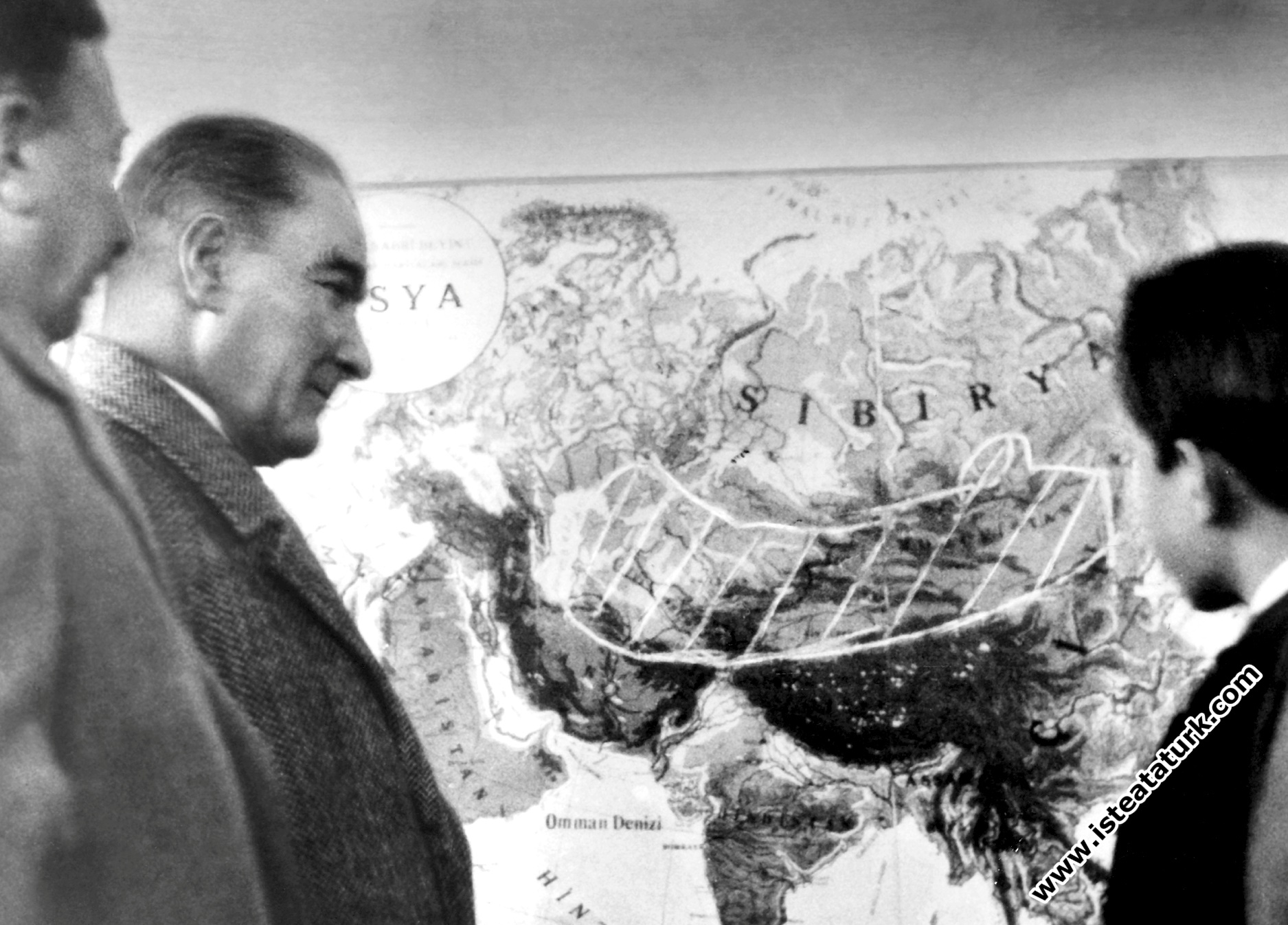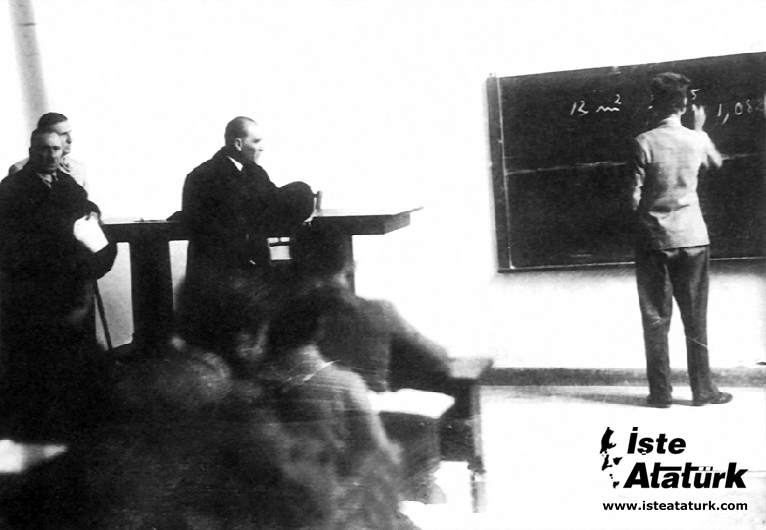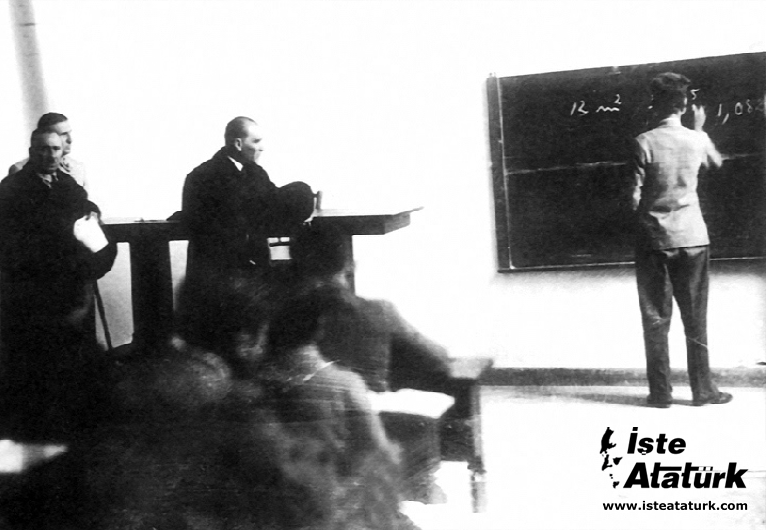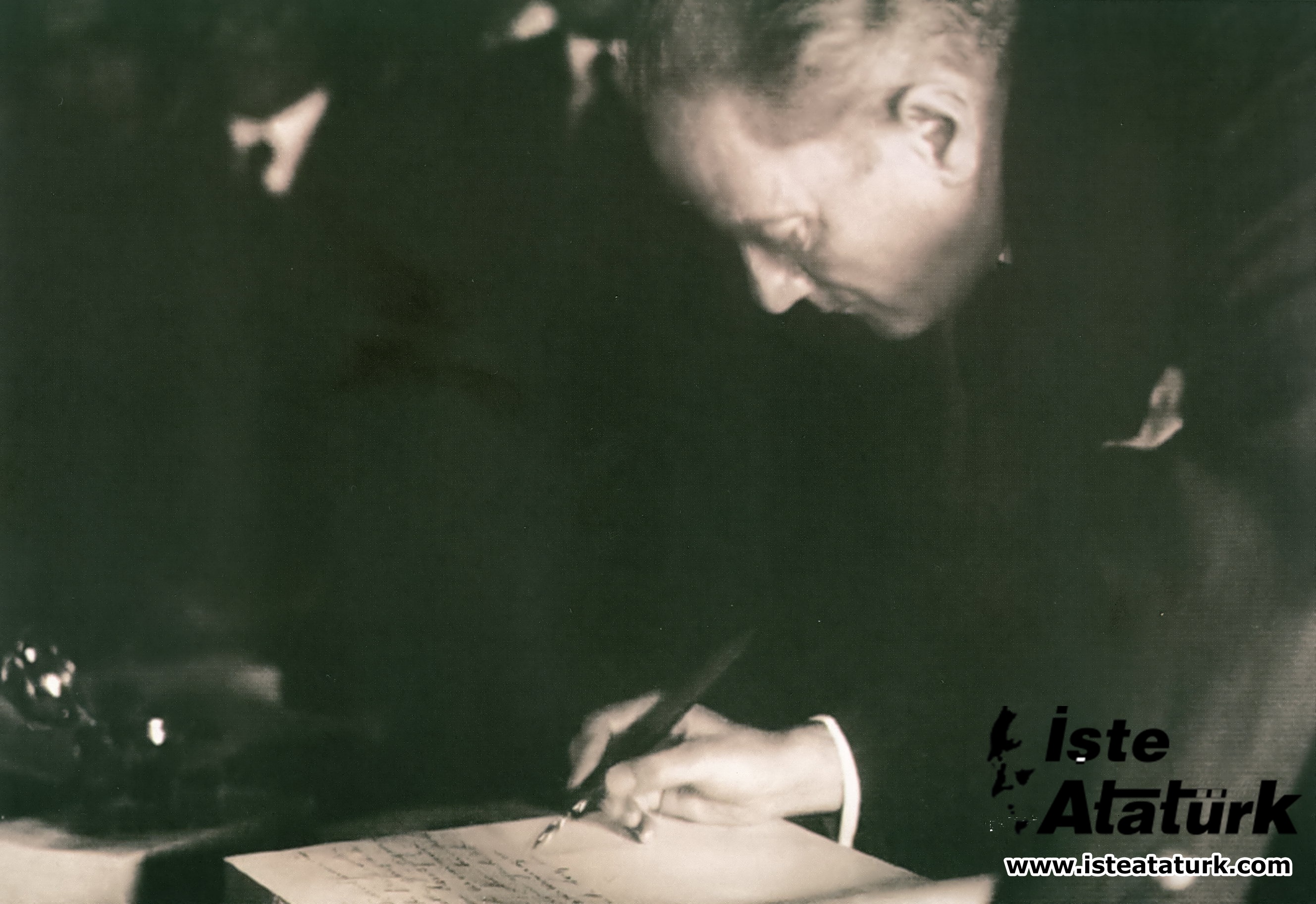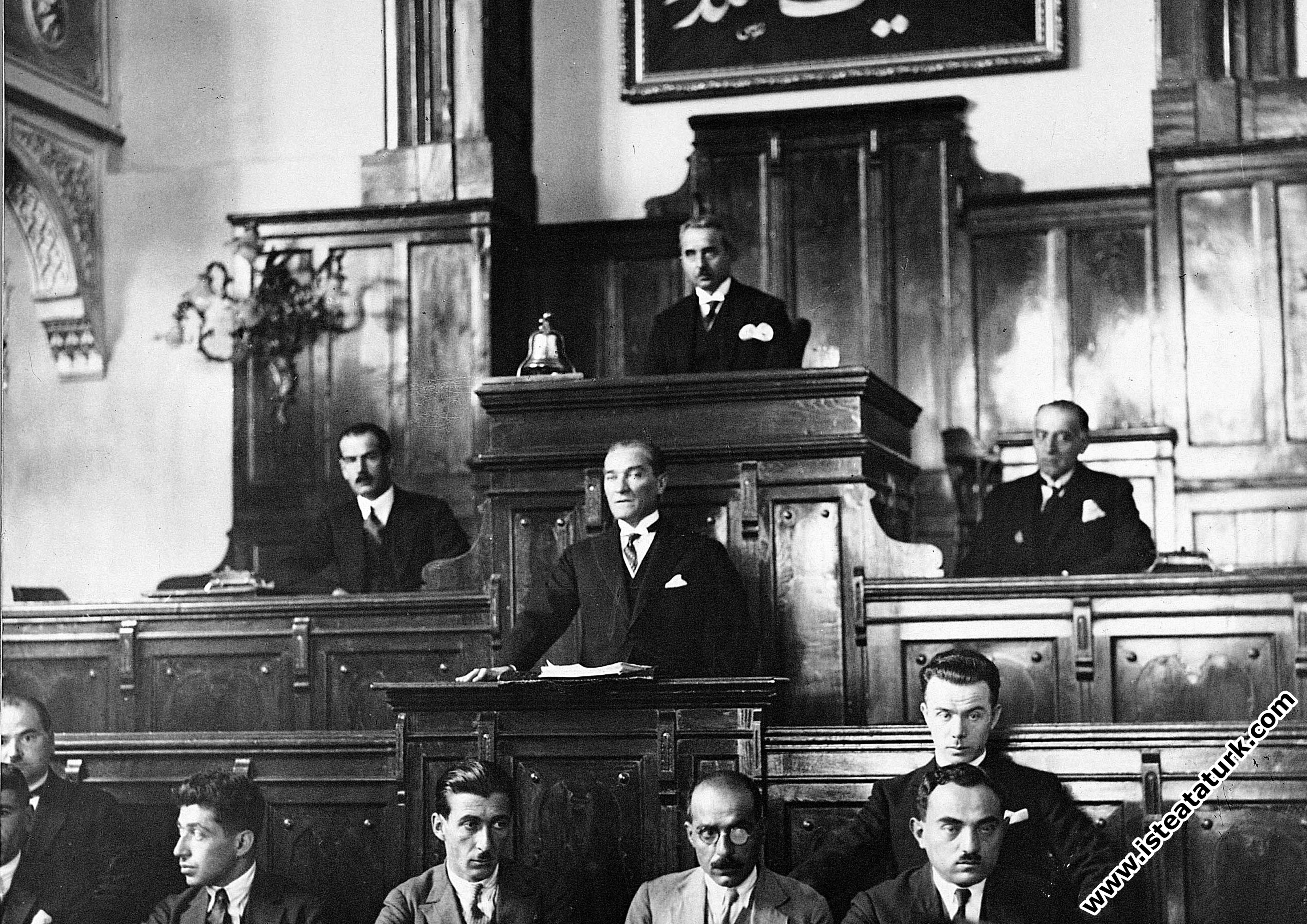
Proclamation of the Republic
Character Size
"Tomorrow we will proclaim the Republic." Mustafa Kemal Ataturk
PROCLAMATION OF THE REPUBLIC
The national sovereignty principle introduced by the 1921 Constitution and the will of the sultan revealed a contradiction. The sultanate remained in a vacuum. On November 1, 1922, the Turkish Grand National Assembly abolished the sultanate. The sultanate was abolished, personal sovereignty was legally a thing of the past. The natural result of this decision would be the establishment of the republican regime. On October 13, 1923, it was decided to make Ankara the capital. On October 29, 1923, the proposal of Atatürk and his friends, which changed some of the articles of the Constitution, revealed a contradiction between the national sovereignty principle brought by the 1921 Constitution and the will of the sultan. The sultanate remained in a vacuum. On November 1, 1922, the Turkish Grand National Assembly abolished the sultanate. The sultanate was abolished, personal sovereignty was legally a thing of the past. The natural result of this decision would be the establishment of the republican regime.
On October 13, 1923, it was decided to make Ankara the capital.
On October 29, 1923, the proposal of Atatürk and his friends to change some of the articles of the Constitution was accepted in the Grand National Assembly with applause and unanimously.
The first article of the Constitution included the provision "The form of government of the Turkish State is the Republic". On the night of the same day, Mustafa Kemal Pasha (Atatürk) was elected as the first President of the Republic of Turkey. With the abolition of the sultanate and the proclamation of the republic, the "Caliphate", which continued to exist in the system, also became unnecessary and dysfunctional. On March 3, 1924, the law proposal submitted by the Deputy of Urfa Sheikh Saffet Efendi and his friends was accepted in the Grand National Assembly, and the caliphate was abolished, and the caliphate became history.
With the acceptance of Lausanne and the establishment of peace, the question of what the form and name of the state would be that would determine the political structure of the Turkish State remained. With the existence of the Turkish Grand National Assembly, a state system based on human rights was established, the sovereignty of which belongs unconditionally to the nation. However, most of the people, as well as those in the Assembly, were bound to the Sultan by religious and traditional ties. The Sultanate-Caliphate office occupied by the Sultan was an ingrained theocratic system for centuries. Since 1300, no family other than Osmanoğulları had been in power. Sovereignty emerged from two sources, one from religion and the other from tradition, and was gathered under the Sultan. Although the Committee of Union and Progress had broken this power, it could not change the essence of the system, that is, the source of sovereignty and the way it was used. From the system of god-rights of sovereignty, As a result of the transition from the Sultan to the nation as a result of the transition to the human rights system, as a principle and ideal, it was set forth in the Amasya Circular and embodied in the BMM on April 23, 1920. The Teşkilat-ı Esasiye Kanunu was also based on this foundation. Since the War of Independence clearly revealed the sovereignty of the nation as well as national independence, the Sultan had been the fierce enemy of the nationalists from the very beginning. Although Mustafa Kemal Pasha knew of the Sultan's betrayal, he did not target the Sultan because he did not have time yet. He kept his "Republican" belief, which he had believed in since his young officer years and had Mazhar Müfit noted in Erzurum, a "national secret". He did not go this way, as introducing a "Republican" idea in the War of Independence would lead to internal disintegration. He even rejected the proposals to declare a "Republic" during the Sivas Congress. But Mustafa Kemal, the Commander-in-Chief of the War of Independence and the savior of the Turkish Nation, took the first step to change Turkey's political structure by abolishing the Sultanate. Even his closest friends opposed the abolition of the Sultanate. Although the conservative wing resisted in the Assembly, the Sultanate was abolished as a result of Mustafa Kemal Pasha's determined and harsh attitude. But his stern attitude caused concern. Those who saw that this was a start tried to prevent Mustafa Kemal Pasha with various methods. He took the first step to change the political structure of the Ottoman Empire by abolishing the Sultanate. Even his closest friends opposed the abolition of the Sultanate. Although the conservative wing resisted in the Assembly, the Sultanate was abolished as a result of Mustafa Kemal Pasha's determined and harsh attitude. But his stern attitude caused concern. Those who saw that this was a start tried to prevent Mustafa Kemal Pasha with various methods. He took the first step to change the political structure of the Ottoman Empire by abolishing the Sultanate. Even his closest friends opposed the abolition of the Sultanate. Although the conservative wing resisted in the Assembly, the Sultanate was abolished as a result of Mustafa Kemal Pasha's determined and harsh attitude. But his stern attitude caused concern. Those who saw that this was a start tried to prevent Mustafa Kemal Pasha with various methods.
On December 2, 1922, a proposal was given to the Assembly by the opposition group. In the motion requesting an amendment to the "Intihab-ı Mebusan Law", it was desired to make the provision of law that "in order to be elected as a member of the Grand National Assembly, it is necessary to be from the people of the places within the current borders of Turkey and the newcomers to the electoral district must have resided in the electoral district for at least five years". Mustafa Kemal Pasha, who took the floor on this motion that wanted to deprive Mustafa Kemal Pasha from being elected as a deputy, stated that his birthplace was outside the borders of Turkey and he did not live in one place for five years, reminding that he fought against the enemies and could not sit anywhere for five years to save the homeland. , He asked from whom these people, who wanted to deprive him of his citizenship rights despite being a person who had won the love of the nation, got this authority. The proposal was rejected.
The opposition group, who took advantage of Mustafa Kemal's trip to Western Anatolia on January 14, 1923 to conduct a public opinion poll, published a brochure entitled "Caliphate-i Islamiye and the Grand National Assembly" the day after he left Ankara. It was understood that the brochure had been prepared in advance and was distributed by taking advantage of M. Kemal's departure from Ankara. The main idea of the brochure is based on the principles that the Islamic public is in great distress from the latest developments (Abolition of the Sultanate), that the Caliphate means the government, and that no one, no assembly has the power to destroy the laws and duties of the Caliphate. get it." He concluded with the words that the executive power should be given to the Caliph and that the decisions and laws of the Assembly were passed on to the Caliph. It was argued that the laws regarding the Sultanate and the Caliphate, enacted by the Assembly, were not legitimate. This declaration was a reaction to Mustafa Kemal and the revolution he wanted to realize.
Mustafa Kemal, who came to Izmit, made a statement on religion and the caliphate, "The Turkish Grand National Assembly is not and cannot be the Caliph's, the Grand National Assembly of Turkey belongs to the nation alone and alone." said. The theocratic state, that the grand program of the TGNA is based on the principles of full independence, unconditional national sovereignty. He stated that its form and the entire social order and interests associated with it would be destroyed. In the meeting he held on January 16, he stated that the Caliphate had nothing to do with religion, that it was a political position, and that a revolution could not be made through the administration of maslahatism, and said, "The law of the revolution is above the existing laws. The revolution and progress we started will not stop for a moment unless it kills us and stifles the current in our minds. " He gave the necessary answer to the reactionaries. Izmit because it wants to establish good relations with the press. While announcing that there will be a "Revolution" in the press conference he held at the same time, he stated that the "Defense-i Law Group" is necessary to ensure unity in the Parliament, and that groups other than this are not beneficial, and asked the Unionists not to interfere in politics for the benefit of the country. Meanwhile, the news of her mother's death, Zübeyde Hanım, came. At his mother's grave in Izmir, he expressed his revolutionary belief: "Let it be a debt of conscience and honor for me to give my life for the sake of national sovereignty." He repeated his words once again. In the meantime, he returned to Ankara with İsmet Pasha, as the first meetings of Lausanne were interrupted. Secret sessions in the parliament were very harsh. The murder of Trabzon deputy Şükrü Bey by Topal Osman led to attacks on Mustafa Kemal. Conservative, reactionary, who saw Mustafa Kemal as a great obstacle to them. Unionists and self-interested groups were uniting in opposition to him. Rauf Bey, Karabekir, Refet and Ali Fuat Pashas, who were close to him, were slowly leaving his side and giving strength to the Khilafahists. Mustafa Kemal, who saw that his friends left him alone in the face of the efforts of the reactionaries who wanted to restore the sultanate, in a speech he made in Konya on March 20, 1923, clearly expressed his attitude towards the reactionaries who wanted to pull Turkey into the darkness of the Middle Ages with these words: "If you want to understand something about them, I personally , I say, I personally am their enemy. A step that they will take in the negative direction, not only against my personal faith, not only against my purpose, but that name is about the life of my nation, that step is an intention against the life of my nation, that name is a poisoned dagger aimed at the heart of my nation. What I and my friends who agree with me will definitely do is to push those who take those steps... Let me tell you something more than that. For example, if there are no laws to ensure this, if there is no parliament to ensure this, if everyone withdraws in the face of those who take such negative steps and I am left alone; hills again, and I will kill again.” The march towards the Republic was clearly seen with these determined words. Mustafa Kemal Pasha, on April 8, 1923, gathered his views on nine principles, while determining his program, he also prepared the political formation. If everyone retreated in the face of those who took such negative steps and I was left alone; hills again, and I will kill again.” The march towards the Republic was clearly seen with these determined words. Mustafa Kemal Pasha, on April 8, 1923, gathered his views on nine principles, while determining his program, he also prepared the political formation. If everyone retreated in the face of those who took such negative steps and I was left alone; hills again, and I will kill again.” The march towards the Republic was clearly seen with these determined words. Mustafa Kemal Pasha, on April 8, 1923, gathered his views on nine principles, while determining his program, he also prepared the political formation.
The task of the wartime TGNA had come to an end. For this reason, the Assembly decided to dissolve itself and hold elections. Before the dissolution, Mustafa Kemal brought an amendment to the Law on Treason, which gave the opportunity to establish Independence Courts, if necessary, in the future, with a law amendment from the Parliament on April 15 that considered those who tried to restore the Sultanate as traitors.
Mustafa Kemal's efforts to form a strong cadre in the newly established Assembly and thus to proclaim the Republic accelerated the alienation of his close friends from him. Rauf Bey and his friends wanted to make Mustafa Kemal passive by suggesting that he should stay above the parties and not get involved in politics. The separation between Rauf Bey and İsmet Pasha was another aspect of this separation. Rauf Bey, who did not want to meet İsmet Pasha, who returned from Lausanne, even resigned from the Prime Ministry.
The Second Assembly approved Lausanne after it convened. Now the problem was determining Turkey's regime. Mustafa Kemal, in a meeting with the reporter of a Vienna newspaper called "Neue Treie Presse" on September 22, 1923, stated that the system established on April 23, 1920 was the Republic, but its name could not be disclosed, and said that the only thing to do was to name it.
It was also a question of where the capital of the new state would be. Ankara has been doing this job since 1920. Its central and safe condition was evident. After long debates in the Assembly, on October 13, Ankara was accepted as the capital with a majority of votes. The Proclamation of the Republic was one step closer.
There was a government crisis that gave Mustafa Kemal the opportunity to declare the Republic. Upon the formation of opposition in the Parliament against Prime Minister Fethi Okyar Bey, M. Kemal decided to resign from the cabinet, apart from the "Vice of Erkan-ı Harbiye General Presidency Fevzi Pasha", and it was implemented on 27 October. According to the current system, each minister was elected individually by the Assembly. If the resigning ministers were re-elected, they would not accept the post. Meanwhile, Rauf Bey, Kazım Karabekir, Ali Fuat, and Refet Pashas were in Istanbul and their contacts were showing closeness to the Caliph. In Ankara, however, a cabinet could not be formed. Upon these developments, Mustafa Kemal, who decided to solve the problem with the "Proclamation of the Republic", invited İsmet Pasha and some people to a meeting in Çankaya on the night of 28 October and said,
The form of government of the State of Turkey is the Republic.
The State of Turkey is governed by the Grand National Assembly.
The State of Turkey administers the administrative branches that the Government has established by means of Executive Proxies (Council of Ministers).
This proposal was discussed at the party meeting. After the meeting of the Grand National Assembly at 18:45 on the same evening (October 29, 1923), at 20.30, the Republic was proclaimed among the voices of "Long Live the Republic" and the name of the new Turkish State was given. "REPUBLIC OF TURKEY" Immediately after, Gazi M. Kemal, the savior of the Turkish Nation, was elected President unanimously. President Mustafa Kemal, who came to the podium, thanked the Assembly that elected him President and said, "The talent and ingenuity that our nation has shown in recent years has proven very well how people who think badly about themselves are people who give importance to appearance. will be able to show its value to the world of civilization much more easily with the new name of the Government.
The war to establish a new and independent Turkish State, which started in Samsun on May 19, 1919, was successfully concluded against foreign and domestic enemies, and the Republic of Turkey was established. Just as the faith and success of the War of Independence were the work of Atatürk, the Republic was also his work. He stated this in the following words in the following years. "My greatest work is the Republic of Turkey."
CONCLUSION
The once magnificent Ottoman Empire went into a rapid collapse from the 18th century as a result of both internal and external factors. Due to the capitulations, it became the open market of European states. Constant attacks by Russia and Austria eventually lost the wars, while selling off important lands. Seeing this collapse of the Empire, the Sultans started reform measures to save the Empire. But these military-only measures were not effective. III. Nizam-ı Cedit, initiated by Selim, ended with a reactionary uprising in 1807.
While the collapse continued in the 19th century, the national independence and sovereignty movements revealed by the French Revolution affected the Christian minorities of the Ottoman Empire living in the Balkans and spurred their desire for independence. Serbian, Greek, and even Egyptian uprisings shook the internal structure of the Empire, and they gradually gained independence or autonomy. In this century, England and France followed a policy of protecting the territorial integrity of the Ottoman Empire in the face of the Russian threat. In the Crimean War, they even declared war on Russia as a result of this policy. While the empire passed into the hands of the West economically with the 1838 trade agreement, it went into financial bankruptcy and financial control of the West in 1881 with the foreign borrowing that started after 1854. II. Mahmut Reform and Tanzimat also did not provide a solution for the liberation of the Empire. The works of the young Ottomans prepared the declaration of Kanun-u Esasi in 1876. While the Ottoman-Russian war of 1877-78 was preparing the end of this period before the First Constitutional Monarchy had the opportunity to live, Abdülhamit's "Oppression" began. After this date, England also abandoned its protective policy. The Armenian issue was also on the agenda for the first time. The Ottoman Empire then approached Germany. German political and military relations brought German economic ambitions. The Baghdad Railway project symbolized this. The Ottoman Empire then approached Germany. German political and military relations brought German economic ambitions. The Baghdad Railway project symbolized this. The Ottoman Empire then approached Germany. German political and military relations brought German economic ambitions. The Baghdad Railway project symbolized this.
While entering the 20th century, the Young Turk movement, which started against Abdülhamit, became increasingly stronger and in 1908 II. He brought the monarchy. However, with the reactionary uprising of March 31, 1909, internal depression occurred. II. Constitutional Monarchy could not save the Empire. This period, in which the Ottomanism, Islamism, Westernism and Turkism movements clashed, created depressions and anarchy inside, and resulted in a great defeat in the Tripoli and Balkan Wars and the loss of all Macedonia abroad. The Union and Progress, which seized power, went to dictatorship. While Enver, Talat and Cemal Pashas, the three powerful men of the Union and Progress, entered the First World War, which started in 1914, on the side of Germany, the fate of the Empire was drawn. The Ottoman Empire, which was defeated in this war with heavy losses, surrendered unconditionally with the Armistice of Mudros.
With the solution of the Eastern Question, which has been going on for a century, and the sharing of the legacy of the Sick Man of Europe, the Turkish nation's presence in world political history was wanted to be eliminated. During the war, with secret agreements, Britain, France, Russia and Italy had decided to share the Ottoman Empire. But when the revolution broke out in Russia, the agreements lost their importance. The greatest force to decide on the Turkish Nation was England. England gave Western Anatolia to Greece, wanted to establish an Armenia and Kurdistan in the East, and shared the rest of the Turkish homeland with France and Italy. The Sultan and the Government, who submitted to the plunder of the country, saw salvation under the auspices of the British. The people and intellectuals were in despair, and the majority seemed to submit to fate. Those who were looking for solutions for salvation could not think of a solution without the Sultan-Caliph. There were those who saw the liberation in the American mandate or those who worked to ensure the liberation of their regions. In the miserable and desperate situation at the end of the First World War, only one person, Mustafa Kemal, came to Samsun with the idea of total liberation and establishing a fully independent new Turkish State. At the time of his departure, the Greeks were occupying İzmir. The Sultan and the Government, on the other hand, were still blindly yielding to every request of the British, who had given Izmir to the Greeks. In the face of these attitudes of the Sultan and the Istanbul Government, who cooperated with the enemy, Mustafa Kemal determined the principles of the war of national independence and national sovereignty as revolting the nation and the army against the Sultan-Caliph in Amasya. Erzurum and Sivas Congresses He also carried out the national awareness, administrative and political organization of the establishment of a new Turkish State within these principles. When these principles were put forward once again in Istanbul with the National Pact, the British occupied Istanbul. Undeterred by this, Mustafa Kemal revealed the principle of national sovereignty, which is the work of the legitimate will of the nation, in Ankara, with the UN. But the realization of all this was done with great difficulties and impossibilities. On the one hand, the attacks and pressures of the Allies and the Greeks, on the other hand, the Sultan and the Istanbul Government's declaration of Mustafa Kemal and the UN as illegitimate had a negative impact on the Turkish Nation. The Turkish Nation, with the Sultan-Caliph, who has been accepted as a religious and traditional power for hundreds of years, destroyed these values and replaced them with national, He vacillated for a while between the values of sovereignty and the M. Kemal movement, which wanted to gather the nation together. In places, uprisings broke out against the authority of the UN. It was fought against the Armenians in Eastern Anatolia and the French in the South. The BMM, which found a solution with the Kuvva-ı Milliye against the Greek Offensive and internal uprisings in the West, later established a regular army. I and II. He achieved his first military success with the İnönü Wars. On the other hand, he signed the Moscow Treaty with the Soviet Union in foreign relations. He defeated the Greek Army in the Battle of Sakarya. Turkey, which also agreed with France, broke up the Entente bloc. The Great Offensive, which started on August 26, 1922 and ended on September 9, with the Greek Army pouring into the sea in Izmir, proved the reality of Turkey and the invincible determination of the Turkish Nation to the whole world. He also confirmed his military success with the Mudanya Armistice and the Treaty of Lausanne. This success of Turkey, which won the war of independence against imperialism and created the "Turkish Miracle", set an example for all Oppressed Nations.
Mustafa Kemal, where the War of Independence ended; He started Turkey's modernization war. With the abolition of the Sultanate on November 1, 1922 and the proclamation of the Republic on October 29, 1923, Turkey realized the new state system, the "National and Secular State" based on human rights, which was revealed by the French Revolution. However, in the Republican era, Atatürk had to give a new struggle for the success of the Turkish Revolution for the struggle to become a modern state and country.
Source: Ergün AYBARS, Türkiye Cumhuriyeti Tarihi 1, Ege Üniversitesi, Basımevi, 1986, Sayfa: 359-366
